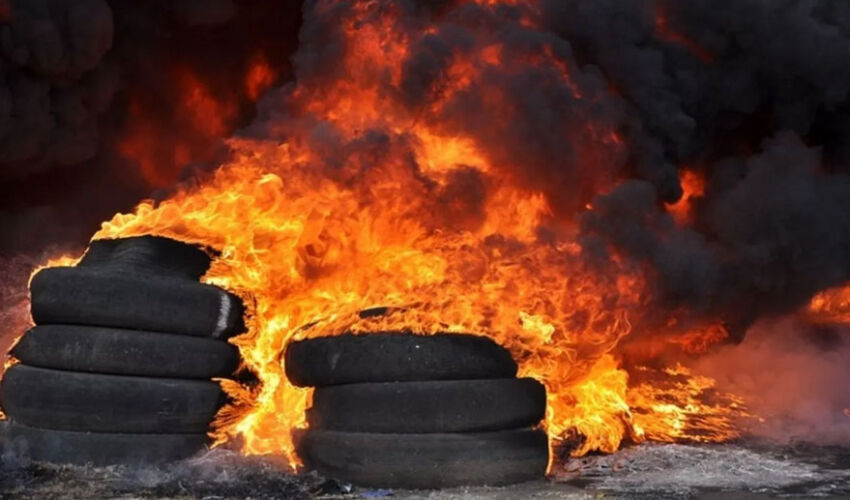
The Environmental Protection Inspectorate (EPI) urged Moldovans to stop burning tires. But many people ignored this warning, including the mayor of a village in Orhei district, who even attacked an environmental inspector.
The head of the PSI, Ion Bulmaga, says it is necessary to amend the environmental legislation and introduce a separate article into it. Besides, he proposes to increase fines from 10 thousand to 50 thousand lei.
The Environment Ministry believes that the residents continue burning tires because they do not fully realize the damage they cause to their health and the environment. They are also not aware that the system of collection and recycling of worn-out car tires is already functioning well in the country.
Burning tires releases dioxins, furans and polycyclic aromatic hydrocarbons into the air. These substances are extremely dangerous to human health, causing respiratory diseases and even cancer.
Tires abandoned in nature slowly deteriorate when exposed to ultraviolet rays and rain. Rainwater leaches chemicals from the rubber, seeping into the soil and groundwater. Thus, heavy metals and hydrocarbons can enter soil and water, affecting ecosystems and even drinking water.
The complete decomposition period of a car tire is 600 years.
The only solution is recycling and recovery. Tires can be recycled into materials for asphalt, sports fields, urban furniture and even energy.
Individuals and legal entities are obliged to hand over worn-out tires to authorized collection points. Specialized stores and tire repair companies may also have this status.
The collection of used tires from individuals is free of charge and without charging them any fees, as prescribed by the Regulation on the Handling of Used Tires, which entered into force on March 23, 2023.
Business entities handling waste tires are required to have an environmental permit and to ensure the creation of a collection network for waste tires through service stations, shopping malls and parking lots. The Environmental Protection Agency and the Environmental Inspectorate oversee the implementation of these regulations.
The number of authorized collection points for used tires has increased compared to a year or two ago, but there are still not enough in some regions.
“The collection process has been improved through the establishment of authorized collection points, but their coverage remains insufficient at the national level,” said Nicolae Strulja, deputy director of the Environmental Protection Agency. – Many car service stations and retailers have started accepting used tires from customers, but there are still those who are not familiar with the regulations in this area and do not know their obligations”
In 2024, 190 economic entities were importing tires into Moldova. Of these, only 95 are registered in the list of extended producer responsibility. According to the Environmental Protection Agency, in 2024, 20 producers carried out individual waste collection and utilization, and 75 – collective utilization.
Collective collection and disposal is carried out through MoldControl, which is the only authorized collective system in the country for waste tires of various types. Today it brings together 98 companies (including DAAC-Hermes, Kaufland, etc.) and has the environmental authorization to manage 10 categories of electrical and electronic equipment, 2 categories of batteries and accumulators, 5 categories of packaging, 3 categories of tires and 2 categories of end-of-life vehicles.
In addition, there are 15 enterprises in Moldova authorized to collect and centrally transport tires to the recycling enterprises (some of them combine this).
There are several companies authorized to recycle worn-out tires in Moldova. Among them is EcoRODALS, a plant in Tiraspol, licensed by the Environmental Protection Agency of the Republic of Moldova, which recycles used tires, turning them into granules and then producing a rubber coating from them. Other plants include EcoElastic and Artesa-Cons in Chisinau and the Lafarge cement plant in Rezina, which burns tires in its kiln using a system of powerful filters.
For example, in early 2024, about 32 tons of worn-out tires accumulated by Moldelectrica SE over the years were recycled at the Chisinau plant into paving stones to be used to cover children’s playgrounds.
In 2024, about 11 thousand tons of tires were imported to Moldova (100 car tires weigh on average one ton). The import of tires grows year by year, as the number of cars increases. At the same time, last year MoldControl had to collect at least 2 thousand tons of tires. Whether it succeeded or not will be known after April 30, when it submits a report to the Environmental Protection Agency.



